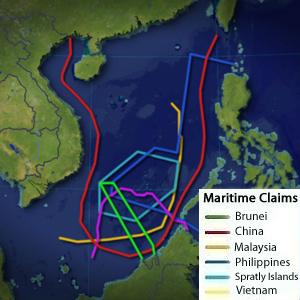
Counteracting Chinese Hegemony in the South China Sea
The South China Sea is one of the most geopolitically contested areas of the world.
In few other places in the world do geopolitics, energy security, maritime law, and balance of power politics come into play in an area of such importance.
The stakes are high in the region. China’s energy demand continues to grow faster than any other country in history. Meanwhile, the South China Sea off its shores could hold 1/3 of the total oil and gas reserves of China – if it were counted as part of its domestic territory. The Chinese government does not want to rely on imports for its energy, so has asserted right to vast stretches of the South China Sea. Unfortunately for China, it is not so simple: the other states bordering the Sea have competing claims. While all sides contest each other’s claims, the threat of military brinksmanship leading to escalating tensions looms.
ASP Adjunct Junior Fellow, and a native of Australia, Matthew Baker writes in this “ASP Perspective” that there are concrete steps the U.S. can take to foster solutions to disputes in the South China Sea.
 Ultimately diplomatic solutions in the South China Sea are in both America and China’s national economic security interests.
Ultimately diplomatic solutions in the South China Sea are in both America and China’s national economic security interests.
You can download the fact sheet here, or read it below:
Counteracting Chinese Hegemony in the South China Sea






[…] ASEAN Summit scheduled for this November. High on the agenda were the territorial disputes in the South China Sea. The ASEAN-China Senior Officials’ Informal Consultations on the Code of Conduct (COC) in the […]
[…] For an ASP Fact Sheet on the South China Sea, click here […]
[…] First of all, fossil fuels are finite and unevenly distributed, meaning that any competition for their acquisition would be a zero-sum game. This competition is likely due the imperfect nature of the energy market. Most of the world’s fossil fuel reserves are controlled by states, not companies. Consequently, they can use this control to exert leverage over consumers. Therefore, states that perceive themselves to be resource-deficient have an enormous incentive to acquire more resources, both in order to hedge against politically motivated supply disruptions, and to exert control over other states. Too often (due to the zero-sum nature of the game), this is likely to be achieved through territorial expansion. As our need for these resources continues to grow, and their readily available supplies continues to dwindle, the incentives for conflict will multiply. (Indeed, a conflict for resources may already be brewing in the South China Sea). […]